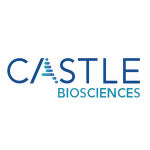Welcome to our dedicated page for Castle Biosciences news (Ticker: CSTL), a resource for investors and traders seeking the latest updates and insights on Castle Biosciences stock.
Castle Biosciences, Inc. (Nasdaq: CSTL) is a diagnostics company focused on molecular tests that guide patient care in dermatologic and gastroenterological disease. The CSTL news feed highlights company announcements, clinical data, financial results and corporate updates that shape how investors and clinicians view its role in precision medicine.
Readers can follow news on Castle’s core test portfolio, including DecisionDx-Melanoma for cutaneous melanoma, TissueCypher Barrett’s Esophagus, DecisionDx-SCC for high-risk cutaneous squamous cell carcinoma, MyPath Melanoma and its suite of tests for uveal melanoma such as DecisionDx-UM, DecisionDx-PRAME and DecisionDx-UMSeq. Coverage also includes updates on AdvanceAD-Tx, the company’s gene expression profile test designed to guide systemic treatment decisions in moderate-to-severe atopic dermatitis.
In addition to product and clinical evidence updates, CSTL news items feature quarterly and annual financial results, test volume trends for core revenue drivers, and guidance ranges reported in earnings releases. Regulatory and corporate governance developments, such as bylaw amendments disclosed in Form 8-K filings, as well as participation in healthcare and investor conferences, are also common topics.
Because Castle Biosciences emphasizes rigorous clinical validation, many news releases center on new studies, meta-analyses and expert consensus papers that evaluate the performance of its tests in real-world and prospective cohorts. These articles provide insight into how DecisionDx-Melanoma, TissueCypher and other assays are being integrated into clinical decision-making.
For investors, clinicians and researchers tracking CSTL, this news page offers a centralized view of earnings announcements, product launches, reimbursement developments, clinical data presentations and corporate events related to Castle Biosciences’ molecular diagnostics business.
Castle Biosciences, Inc. (CSTL) will release its financial results for Q3 and the nine months ended Sept. 30, 2022, after market close on Nov. 2, 2022. The company will host a conference call at 4:30 p.m. Eastern time on the same day to discuss these results. Castle Biosciences focuses on innovative tests that guide patient care and has a portfolio that includes diagnostics for skin cancers and other conditions, with ongoing R&D for new tests targeting high clinical needs.
Castle Biosciences (CSTL) presented new data at the 30th United European Gastroenterology Week in Vienna, showing that its TissueCypher Barrett’s Esophagus Test significantly improves physician accuracy in assessing the risk of high-grade dysplasia (HGD) and esophageal adenocarcinoma (EAC) in patients with Barrett’s esophagus. Participants using TissueCypher were 65.6% more likely to predict progression to HGD or EAC, and adherence to management guidelines improved. The test is supported by multiple peer-reviewed publications and is critical for enhancing patient care and treatment strategies.
Castle Biosciences (Nasdaq: CSTL) presented a poster at the CAP22 Annual Meeting showcasing its DiffDx-Melanoma test, which demonstrated over 98% accuracy in diagnosing melanocytic lesions. The test supports decisions for local excision in challenging cases where traditional methods are inconclusive. The company’s gene expression profile tests aim to aid dermatologists in providing confident treatment plans for approximately 300,000 ambiguous lesions annually in the U.S. Detailed case study results are available in the presented poster.
Castle Biosciences, Inc. (NASDAQ: CSTL) presented impactful data at the 2022 ASDS Annual Meeting, showcasing its DecisionDx®-SCC test for cutaneous squamous cell carcinoma (SCC). This 40-gene expression profile test helps predict metastasis risk, enabling better patient management. Notably, 42% of Mohs surgeons reported increased confidence in their treatment decisions when using the test. The study revealed that familiarity with DecisionDx-SCC was high among clinicians (97%), emphasizing its role in guiding risk-aligned management strategies.
Castle Biosciences (CSTL) announced a study validating its DecisionDx-Melanoma test published in the Journal of the American Academy of Dermatology. The test integrates tumor biology with clinicopathologic factors to provide personalized risk estimates for melanoma recurrence. Key findings include that 44% of patients could avoid sentinel lymph node biopsies without compromising survival rates exceeding 98%. The proprietary algorithm demonstrated a multivariate hazard ratio of 20.00 for predicting melanoma-specific survival, suggesting enhanced decision-making in cancer management.
Castle Biosciences (Nasdaq: CSTL) presented a framework for its diagnostic gene expression profile tests, MyPath Melanoma and DiffDx-Melanoma, aimed at enhancing clinical decision-making for melanoma diagnoses during the Maui Derm NP+PA Fall 2022 Conference. The proposed clinical workflow highlights how these tests can reduce diagnostic uncertainty, particularly in distinguishing between benign and malignant melanocytic lesions. The tests demonstrated a significant reduction in unnecessary excisions for benign results and increased visits for malignant cases, thus offering personalized treatment plans.
Castle Biosciences announced its three-year financial targets during an Investor Day event, projecting total revenue of
Castle Biosciences (NASDAQ: CSTL) has been honored with the 2022 AZBio Fast Lane Award for its significant growth and commitment to patient care over the past 18 months. The company saw its workforce more than double, expanding from 201 to over 480 employees. Key achievements include strategic acquisitions in gastroenterology and mental health, the publication of 22 peer-reviewed papers, and a collaboration with the National Cancer Institute revealing a 27% improvement in survival rates for melanoma patients tested with DecisionDx-Melanoma.
Castle Biosciences (CSTL) will present at Baird’s 2022 Global Healthcare Conference on Sept. 13, 2022, at 2:00 p.m. ET. The presentation, led by CEO Derek Maetzold and CFO Frank Stokes, will be available via a live audio webcast on their website, with a replay for 90 days. Additionally, they will participate in one-on-one investor meetings at the Lake Street Best Ideas Growth Conference on Sept. 14, 2022. Castle is focused on diagnostics for conditions like skin cancers and Barrett’s esophagus.
Castle Biosciences, Inc. (CSTL) will host an Investor Day on Sept. 20, 2022, from 4:00 p.m. to 6:30 p.m. EDT, featuring insights on corporate strategy, growth plans, and financial outlook. Key executives, including


